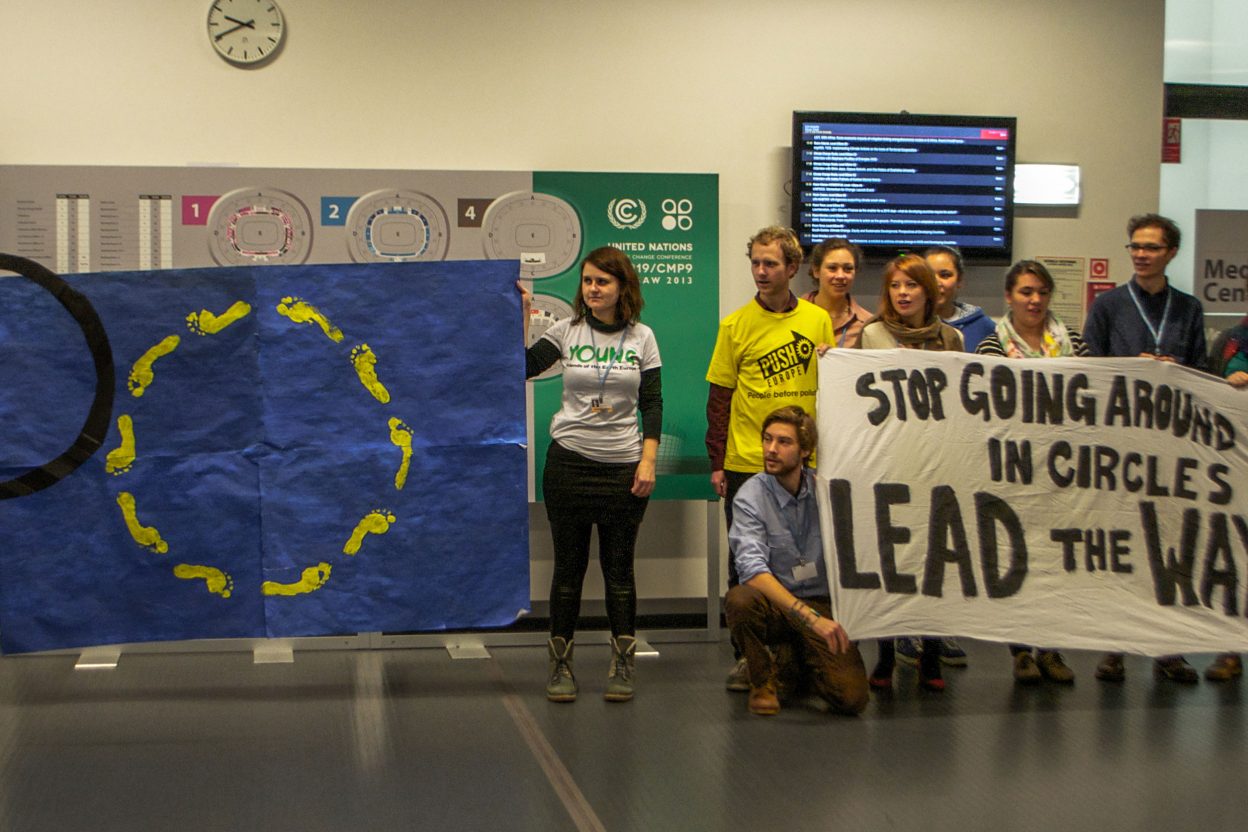In the run up to the COP21 UN climate talks in Paris this December (more here on how to join us and take action), we’re busting some commonly-heard climate myths, from big business being part of the solution to putting our faith in techno-fixes. Catch up with last week’s mythbuster – “It’s all China and India’s fault!”.
Comments or questions about this article? Come and find us on Facebook and Twitter
The myth
In recent years, the European Union has been presented as a role model on climate action, with the mainstream media regularly praising its efforts and ambition. The EU 2020 climate and energy package in particular was portrayed as a breakthrough in climate policy: European countries were joining together for the common good, around common goals and objectives, surpassing their political differences, showing that regional climate action was possible. In public debate, the EU is still perceived as being the most progressive force at the UN Climate talks.
1. The EU’s behaviour in the UNFCCC
The United Nations Framework Convention on Climate Change (UNFCCC) is based on the principles of equity, common but differentiated responsibilities and respective capabilities. This means that it puts the obligation to reduce current emissions on developed countries on the basis that they are historically responsible for the current levels of greenhouse gases in the atmosphere. The European Union, alongside other developed nations, has been trying to escape its historical responsibilities, and thus not following or even going against the principles of the UNFCCC.
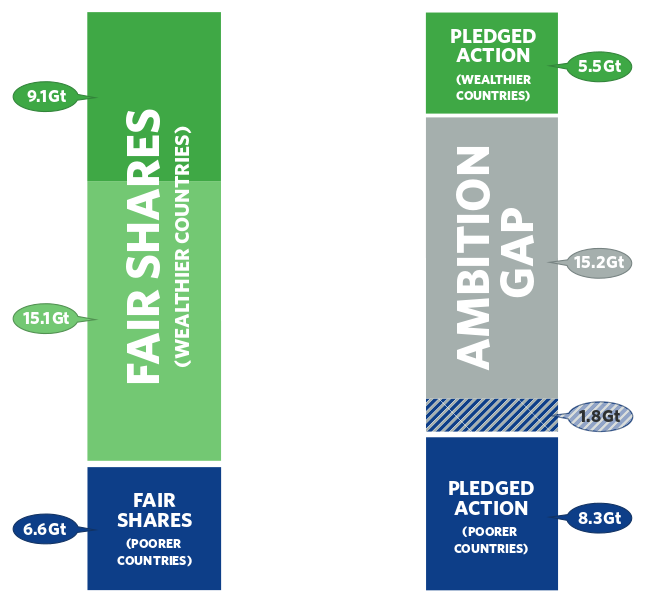
As we detailed in our last myth buster, historical responsibility is still relevant today because of CO2 and other greenhouse gases’ lifespan. Rich European countries have emitted close to one third of greenhouse gases globally due to fossil fuel combustion in the last 40 years, and that CO2 is still warming our atmosphere.
It’s also worth noting that contributions to the Green Climate Fund by European nations have been notoriously low, very far from what was agreed in Copenhagen in 2009. Developed countries made commitments to so called fast-start finance (US$30 billion in 2010-2012) and long-term finance (US$100 billion per year by 2020) – for both mitigation and adaptation action. 10 billion US$ had been announced by October this year (out of the 100 billion), but almost half of the amount is still only pledges, which means that these commitments are not binding. The nature of the funds has also been heavily criticised at the last round of climate negotiations in Bonn in 2015, with experts pointing out the greenwashing and “creative accounting” at play. It’s important to highlight that the money that goes into the fund to help developing countries deal with climate change needs to come from the public sector and not private, otherwise developed nations once again fail to fulfil their legal commitments (according to the UNFCCC).
The EU’s positive image also conceals the fact that the group regularly engages in backdoor bullying of countries from the Global South using “divide and rule” methods.
In addition, the EU occasionally tries to silence civil society. At the climate talks in Warsaw in 2013, three of our activists were kicked out for standing in solidarity with the Philippines after it was hit by a super typhoon. At the most recent COP negotiations in Bonn in October 2015, when Japan asked to exclude civil society from participating as observers, the EU stayed silent. At the same time, developing countries (the G77 + China block and others) advocated strongly to keep civil society in the room to ensure a fair process with fair outcomes.
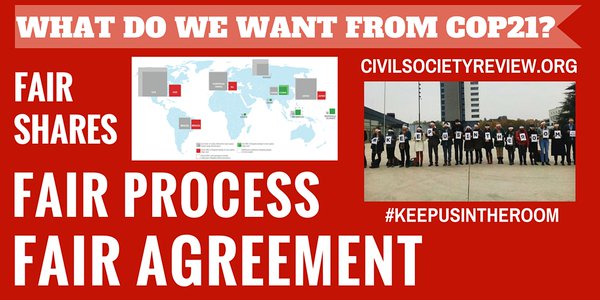
And to have the full picture in mind when we talk about historical responsibility – Europe’s wealth stems from the exploitation of entire continents. Europe has exported the capitalist and extractivist economic model to the world, and has grown rich off it. European corporations have devastated countries in the Global South and exploited its people.
2. EU’s policies are influenced by the fossil fuels lobby, and do not reflect its fair share or pave the way for a just transition
The EU’s 20/20/20 plan was insufficient when it was adopted in 2008. The EU committed to reduce 20% of emissions, to increase energy efficiency by 20% and to reach 20% of renewable energy in the total energy consumption by 2020. Friends of the Earth Europe called for a 40% target for domestic emission cuts and appropriate finances for developing countries by 2020 – it’s technically possible, financially feasible, and estimates the EU’s fair share of financial contributions to developing countries.
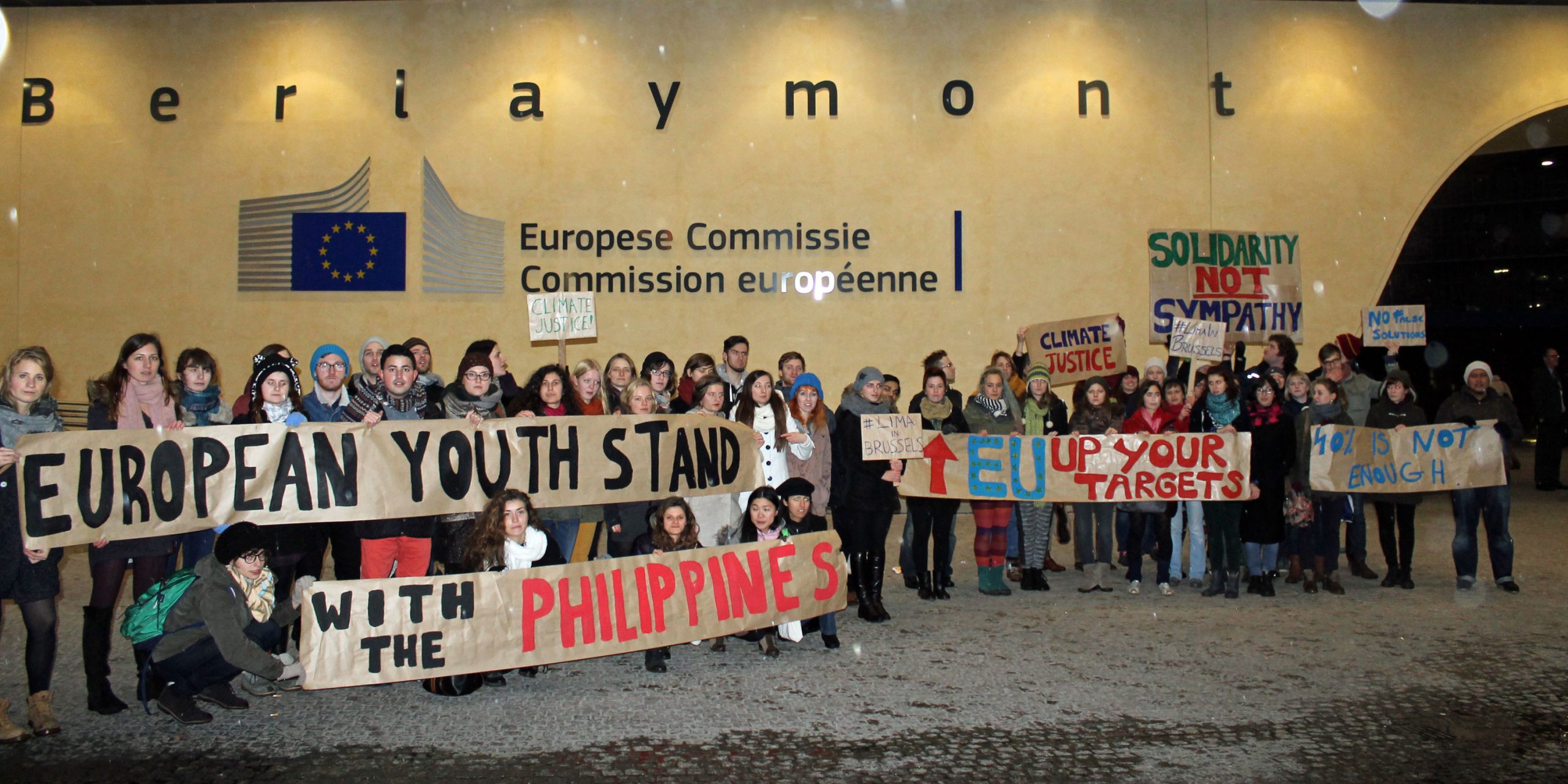
Proof how ridiculously low the 2020 targets are is that the EU already reached those targets last year and is on the way to reach 30%, and it has no plan to raise ambition. This is unacceptable – civil society and developing countries are calling for a review of the pre-2020 period and urging the EU to step up and and do its fair share.
On top of that, it was crucial that the new 2030 climate and energy package (for 2020-2030 period) heightened the ambition level. Instead, the EU settled for 40% emissions reduction (which should be reached by 2020 and not 2030), when science and equity demand 80%. The renewable energy target is also worryingly low, at just 27%. The 40% target is what the EU pledged as its INDC (Intended Nationally Determined Contribution = domestic emissions reduction target) to the UNFCCC. This is nowhere near enough – its INDC represents just over a fifth of its fair share (check out the civil society review of INDCs). Additionally, these pledges are only about mitigation (emissions cuts), and there is nothing on the table when it comes to adaptation, finance or technology transfer.
Political ambition is missing. And of course, the fossil fuel industry is again at play here – this publication from Corporate Europe Observatory shows just how close Europe’s dirtiest industries are to senior politicians and regulators, and what influence this is having on the EU’s official climate change policy.
The designation of Miguel Arias Canete as the Energy and Climate Change Commissioner – the EU’s representative at UN climate talks – prompted a huge mobilisation, as the politician was known to have deep ties with the oil industry and a very poor record on environmental policy in Spain. A petition garnered close to 600,000 signatures to prevent his designation, but European Commission President Jean-Claude Juncker pushed ahead with his appointment regardless.
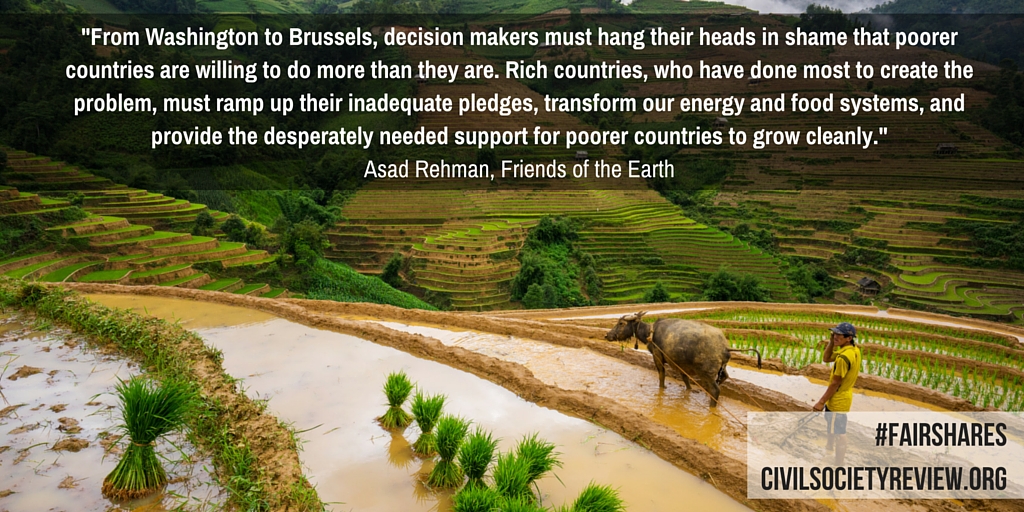
When it comes to the fossil fuels industry, it’s obvious they are pulling the strings behind the scenes. Another example is the Fuel Quality Directive. In December last year, the European Commission’s weak proposals for the implementation of EU climate legislation for reducing emissions from transport fuels passed in the European Parliament, despite a rejection by the majority of MEPs who voted. The Fuel Quality Directive obliges European fuel suppliers to reduce the greenhouse gas emissions from their fuels by 6% by 2020. But the problem is that the proposed implementation measures, despite recognising the high emissions of some fuels, do not set out any measures to discourage their import. So this Directive, instead of preventing the import of tar sands to Europe, does the opposite. Tar sands are one of the world’s dirtiest fuels – 23% more carbon intensive than conventional oil according to research commissioned by the European Commission. The well-known climate scientist James Hansen said it clearly – the exploitation of the Canadian tar sands will be ‘game over for the climate‘.
Read here how the Directive got passed due to heavy pressure from the oil industry, and the Canadian and US government.
Need more proof? Here is another major issue – fracking companies are dominating the behind-the-scenes agenda on EU fracking policies, investigation by Friends of the Earth Europe and Corporate Europe Observatory shows.
To add another bad policy to the mix, the EU is also pushing biofuels (i.e. agrofuels = plant-based fuels from agriculture). There is a huge problem with these fuels on a global level as they are worsening climate change, threatening people’s food security, driving land grabs, and destroying forests and other crucial ecosystems outside of Europe. There was a small step forward in February this year when the European Parliament voted to limit the use of biofuels from food crops that can be used to fuel Europe’s cars. But this is not enough to actually end “food for fuel” because the limit would still expand the use of food crops for fuel and would not end biofuels competing with food production.
To understand the complexity of EU’s policies, it’s important to also talk about financial institutions. The EIB, or European Investment Bank, is the EU’s bank and its main objective is to fund European projects. It is a public institution which distributes public money, and as such it should promote the general interest. In Lima in 2014, the EIB sponsored a corporate climate summit, running parallel to the UN climate talks, promoting business driven, ‘low carbon’, false solutions.
During the talks, Young Friends of the Earth Europe activists organised an action in Brussels to denounce their practices. The EIB still lends three quarters of its research funds (around 10 billion euros annually) to the automobile industry in spite of its Climate Action Programme. What is more, efficiency improvements at coal or gas plants are categorised as climate-friendly when in fact they prolong the lifetimes of these polluting plants; any such improvements should be targeted at communities who live in energy poverty. And the bank’s stance remains ambiguous on new forms of energy that are a threat to the climate like shale gas. Read more about our action in Brussels.
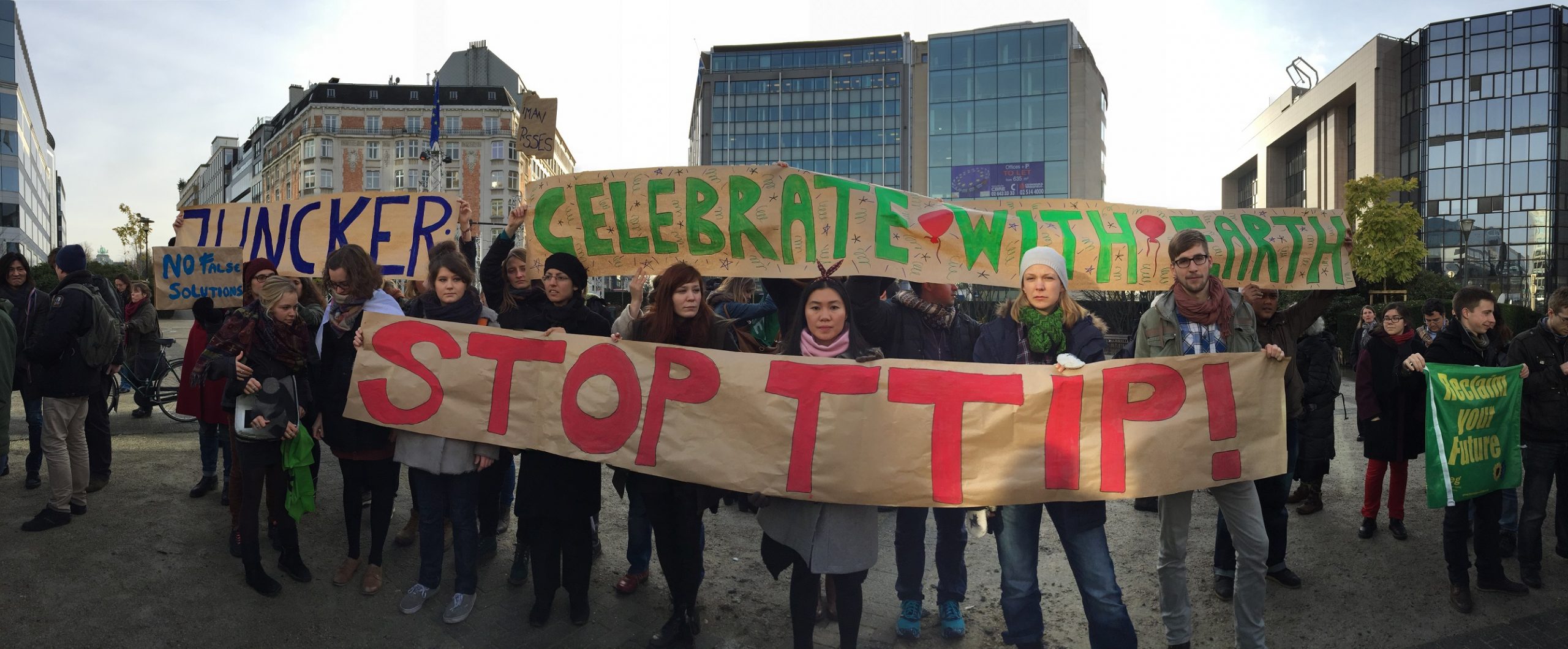
Last but not least, as civil society has been voicing for more than two years, saving the climate and the Transatlantic Trade and Investment agreement (or TTIP) are incompatible. The United States and Canadian governments are using ongoing trade talks to push the European Union to allow climate devastating tar sands into Europe.
As democratic principles have been trampled by the European Commission, negotiating secret treaties behind closed doors, more than 3 million European citizens have demanded an end to the project. Read more: TTIP Factsheet
3. Europe’s dirty investments
European governments, rather than leading the transition away from dirty energy, are still investing heavily in the fossil fuel sector.
In Germany, a massive civil disobedience action this summer, Ende Gelände, attempted to stop the biggest coal mine in Europe. In France, new oil drilling permits have been given out by the government a few weeks ago. On the other hand, YFoE and FoE France alongside other organisations have managed to pressure the French energy giant Engie to stop investing in coal.
In the UK, David Cameron’s government has fast-tracked fracking, with a fresh round of licenses granted for oil and gas exploration across the country. Ambitious renewables projects have been blocked, while mega gas-fired power stations have been approved.
ENI, the energy multinational in which Italy has a minority stake, is preparing to drill in the Arctic, extract oil in Mozambique, and drill the Adriatic Sea, amongst other projects.
Not only do European governments finance dirty energy projects, they also export support for them through international finance. The UK’s export credit agency for example, between 2010-2015 gave 300 times more in funding to fossil fuel projects than renewables schemes. Check out Banktrack’s work on how European banks are funding dirty projects all over the world.
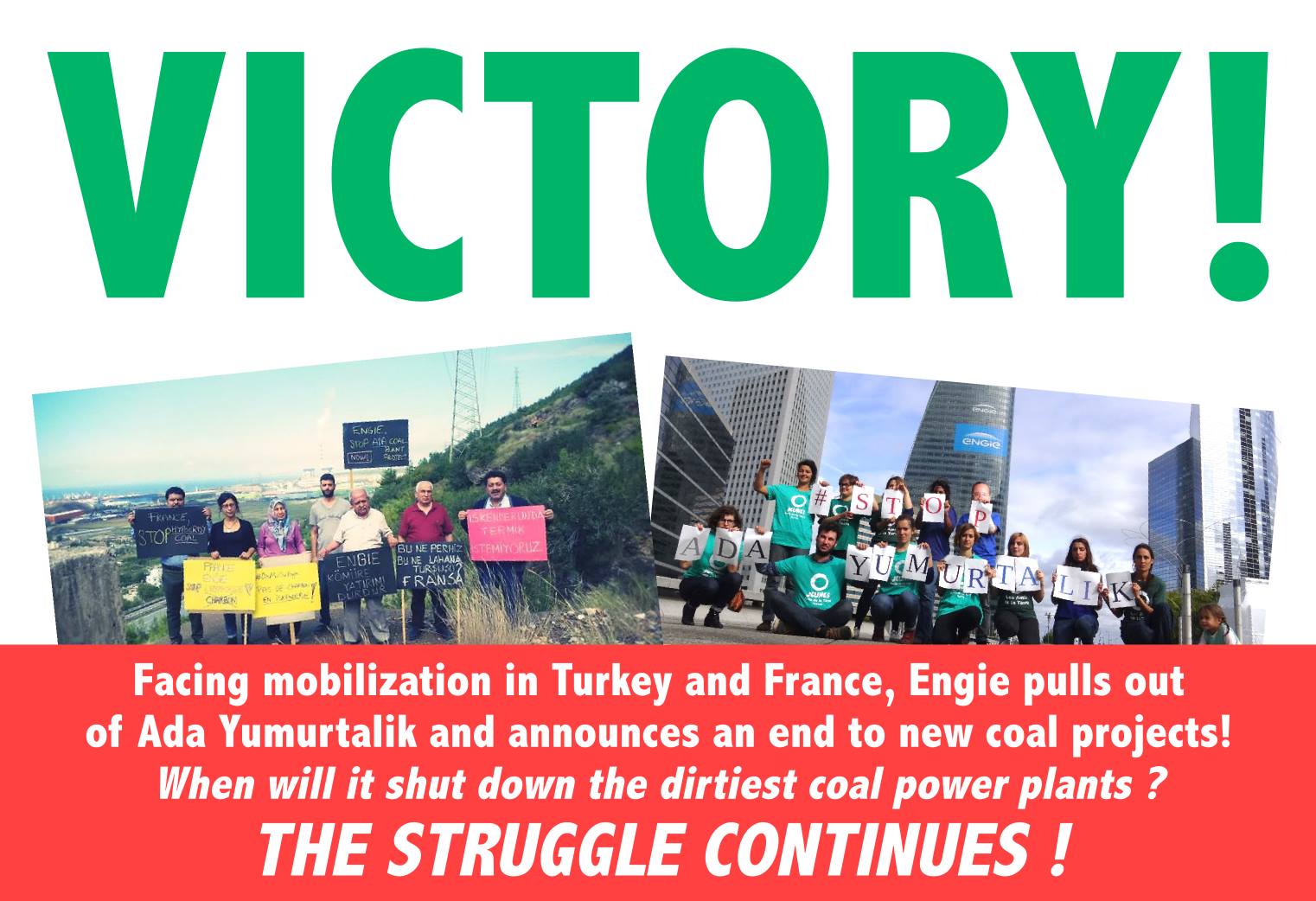
4. Offsetting our transition
Carbon markets: how Europe is exporting its transition with dirty projects
The EU’s emission trading system (ETS or carbon markets) – hailed at the time for being a revolutionary and ambitious structure – is now seen by some as a huge failure. To some, the system can be fixed, and the failure can be attributed to a few mishaps, but we see it as further proof that any climate-fix that doesn’t take into account the root problem is bound to fail. Reliance on the ETS means Europe will continue to fail to meet its share of the climate challenge. Furthermore, the EU’s preoccupation with carbon markets is also obstructing other certain measure for reducing emissions. It provides an incentive to procrastinate on climate action.
Read more: Some civil society groups like Corporate Europe Observatory have called to scrap the ETS.
Offsetting is not just inefficient, it’s also unfair. Acting on climate justifies the imposition of huge destructive projects – like electric mega dams – in the Global South. Local communities are fighting these projects and meeting repression, leading to the creation of anti-offsetting mechanism networks, like the NO REDD in Africa network.
Read more about Friends of the Earth Europe’s position on offsetting.
5. #RefugeesWelcome, Frontex and COP21
The EU bears responsibility on so many levels – from the current economic system that’s devastated our planet to human tragedies.
The typhoon Haiyan that hit the Philippines in 2013 killed more than 6,000 people. More than 1500 migrants drowned in the Mediterranean just in the first four months of this year. There are now some studies that even make connections between climate change and war.
What we are seeing now in Europe is a humanitarian crisis or better said – crisis of humanity. The EU is yet again turning its head and denouncing responsibility for the hundreds of thousands fleeing to Europe. Frontex, EU’s border police, is strengthening “fortress Europe” and yet again proving that Europe was never open, and that EU’s principles of unity, multiculturalism and tolerance have died. During the UN climate talks in Warsaw in 2013, YFoE Germany/BundJugend organised an action in front of the Frontex office, calling for legal protection of climate refugees and against the current European asylum policies.
The EU needs to be held accountable for creating injustices like the current refugee crisis – root causes range from the arms trade, fueling wars to climate inaction – and for acting like cowards in dealing with the situation, closing borders, building fences to slow down the movement of refugees, and shifting responsibility to poorer countries in South-Eastern Europe.
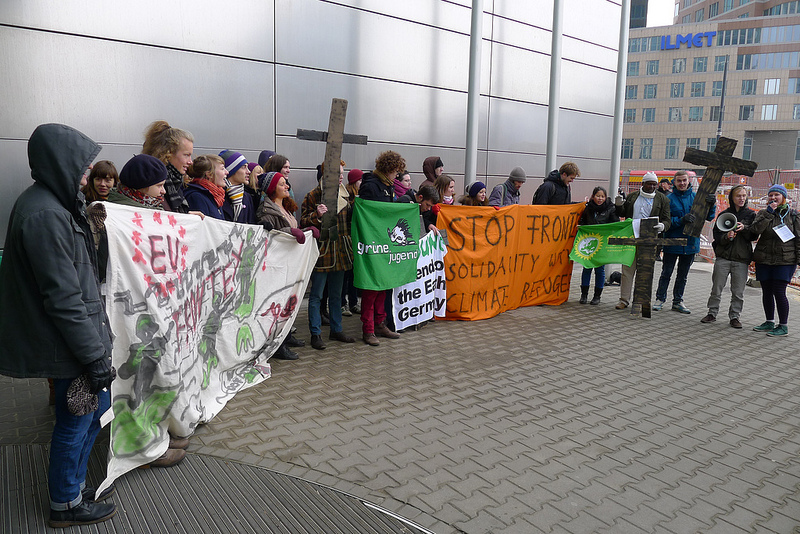
What needs to be done, and what many civil society organisations and volunteers working on the ground are calling for is the establishment of an international security corridor which would allow the safe movement of refugees and arrival at their desired destination. Here are some (tragic) recollections from a volunteer and journalist helping refugees on the borders of Europe, in Greece.
Read more on why we should stand in solidarity with refugees.
And the cherry on top – to prepare for the big COP21 climate conference, Parisian authorities are conducting urban cleansing i.e. “cleaning the city”. The crackdown targets homeless people, inhabitants of shanty homes and squats, Roma people, refugees, but also organisations that work to provide assistance to vulnerable populations. We will ensure that France and the EU are held accountable for their (in)actions over the past months and years.
To conclude – if the EU does not act on climate change in a fair and just way, many more millions will have to flee their countries, and even lose their lives. The International Red Cross estimates that there are more environmental refugees than political refugees fleeing from wars and other conflicts. The United Nations High Commissioner for Refugees (UNHCR) says 36 million people were displaced by natural disasters in 2009. In the floods in Western Balkans in May 2014, almost a million people were displaced. Scientists predict that the number will rise to at least 50 million by 2050. Some say it could be as high as 200 million. Read more on environmental refugees here.
To conclude
Of course it’s not only the European union that has the responsibility to act on climate change and do its fair share. Similar things can also be said about other rich developed nations like the US, Canada, Japan, who are often blocking meaningful progress. But it’s our role as Europeans to point out EU’s responsibilities.
Although this myth buster might be quite negative, there have been positive developments in the EU, especially when it comes to renewable energy and energy efficiency.
Many inspiring stories are coming from members states across Europe with booming community power projects. Read more in this brochure from Friends of the earth Europe.
We are coming now to what this myth buster is addressing – who is actually leading the way? It’s surely not the EU’s governments and politicians. It’s EU’s citizens who are leading the transformation – from fighting dirty energy projects and implementing solutions like community energy, to local food production. It’s also developing countries who are pledging and doing more than what their fair shares in cutting emissions is. It’s communities on the frontlines of climate changes fighting with everything they got and already practicing real solutions. It’s the social and climate justice movements supporting those communities, and putting their voices in front.
And it’s the youth calling out the European Union on its false claims of leadership, and building a new radical movement which is driven by principles of intersectionality and justice.

